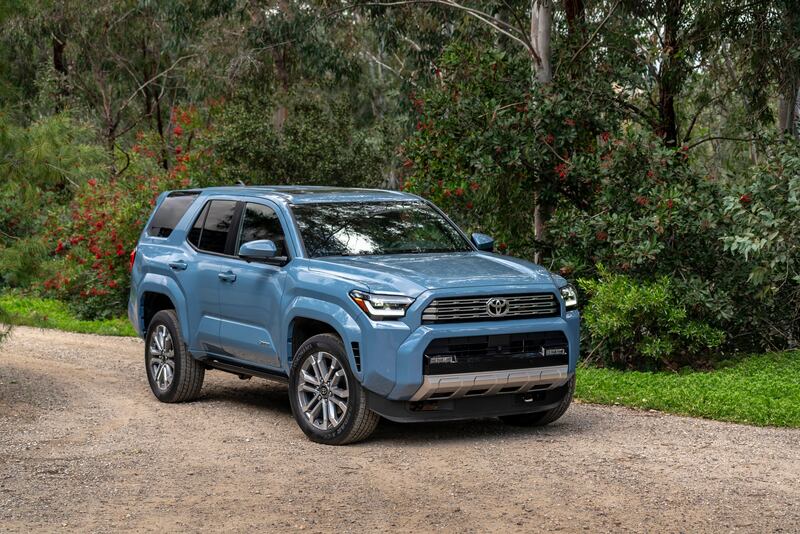The Toyota 4Runner has long carried a reputation as a rugged, body-on-frame SUV that thrives off-road while maintaining everyday drivability. For 2025, Toyota continues that tradition with updates to the powertrain and features that reveal both strengths and compromises.
I spent a week in a well-equipped Limited 4x4 test model priced at $62,875, including a long list of options, to see how the latest 4Runner stacks up in a market filled with a lot of high-quality competitors.
While I have complained a bit in the past about the replacement of V6 powerplants with smaller 4-cylinder turbos, there is a point where reality sets in and you stop the fruitless banter and accept this is how it’s going to go. I’m there.
The 2025 4Runner Limited 4x4 comes standard with a new 2.4-liter turbocharged four-cylinder engine, paired to an 8-speed automatic transmission. This powerplant replaces the older naturally aspirated V6, offering 278 horsepower and 317 lb-ft of torque.
Upsides include more torque at lower RPMs, which is noticeable when merging onto highways or towing, and acceleration feels more confident than previous testers. The 8-speed transmission is nice, shifting smoothly under most conditions. However, the four-cylinder engine lacks some of the refinement and natural smoothness of the outgoing V6. At higher revs, the engine can sound strained, and under heavy acceleration, it’s louder than expected for a vehicle in this price range.
For daily driving, I found the 4Runner to be quite competent, but drivers who fondly remember the traditional V6 may miss its more relaxed character. I guess this is where I stop blabbering about the loss of the V6.
Toyota quotes fuel economy at 20 mpg city, 24 mpg highway, and 21 mpg combined. These numbers are an improvement over the previous generation’s ratings and are welcome for anyone who spends time commuting or on long trips. For a body-on-frame 4x4 with genuine off-road capability, the improvement is notable.
I found the Limited trim on my tester to be a blend of durability and upscale touches. Leather seating, a modern infotainment system with a large touchscreen, and well-placed physical controls make the cabin very user-friendly. Toyota’s decision to retain some hard buttons for climate and audio is a welcome nod to practicality.
Optional equipment on my test model included third-row seating ($1,330), which expands the SUV’s versatility. However, the third row is best suited for children or short trips, as legroom is tight and accessing the seats can be cumbersome. The power running boards ($1,005) added convenience for climbing in and out, especially for shorter passengers.
On the road, the Limited trim is comfortable, with suspension tuning that balances ride quality against off-road readiness. It’s not as plush as some crossover competitors, and road noise is more noticeable than in luxury-oriented SUVs, but the 4Runner’s rugged character is part of its appeal.
Toyota equips the 4Runner Limited with a suite of driver assistance and safety technologies, including adaptive cruise control, lane-departure warning, and blind-spot monitoring. The Tow Tech Package ($400) enhances towing capability with features like trailer sway control, which works seamlessly when hauling. The Gloss Black Roof Rack ($420) added a cool touch the the exterior style while preserving the SUV’s utility.
I found the infotainment to be straightforward, with support for Apple CarPlay and Android Auto. However, some rivals in this price bracket offer more cutting-edge digital displays and higher-resolution graphics. Toyota has chosen function over flash, which will appeal to drivers who prioritize ease of use.
Behind the wheel, the 4Runner Limited feels solid and reassuring. Steering is precise enough for a large SUV, and the elevated seating position provides excellent visibility. Off-road, Toyota’s heritage shines, with 4WD capability and chassis durability that few midsize SUVs can match.
The base price for the Limited 4x4 starts at $57,400, but my tester included options that pushed the final tally to $62,875. At this price, the 4Runner competes directly with vehicles like the Jeep Grand Cherokee and Ford Bronco, as well as well-equipped crossovers. The Toyota’s resale value, reliability reputation, and true off-road ability help justify the cost. In the end, the 4Runner continues to know its audience and delivers exactly what they expect.
• John Stein is a freelance journalist based in Chicago. He has more than 25 years of experience driving, testing and writing about the automotive industry, its latest innovations and vehicle performance.
